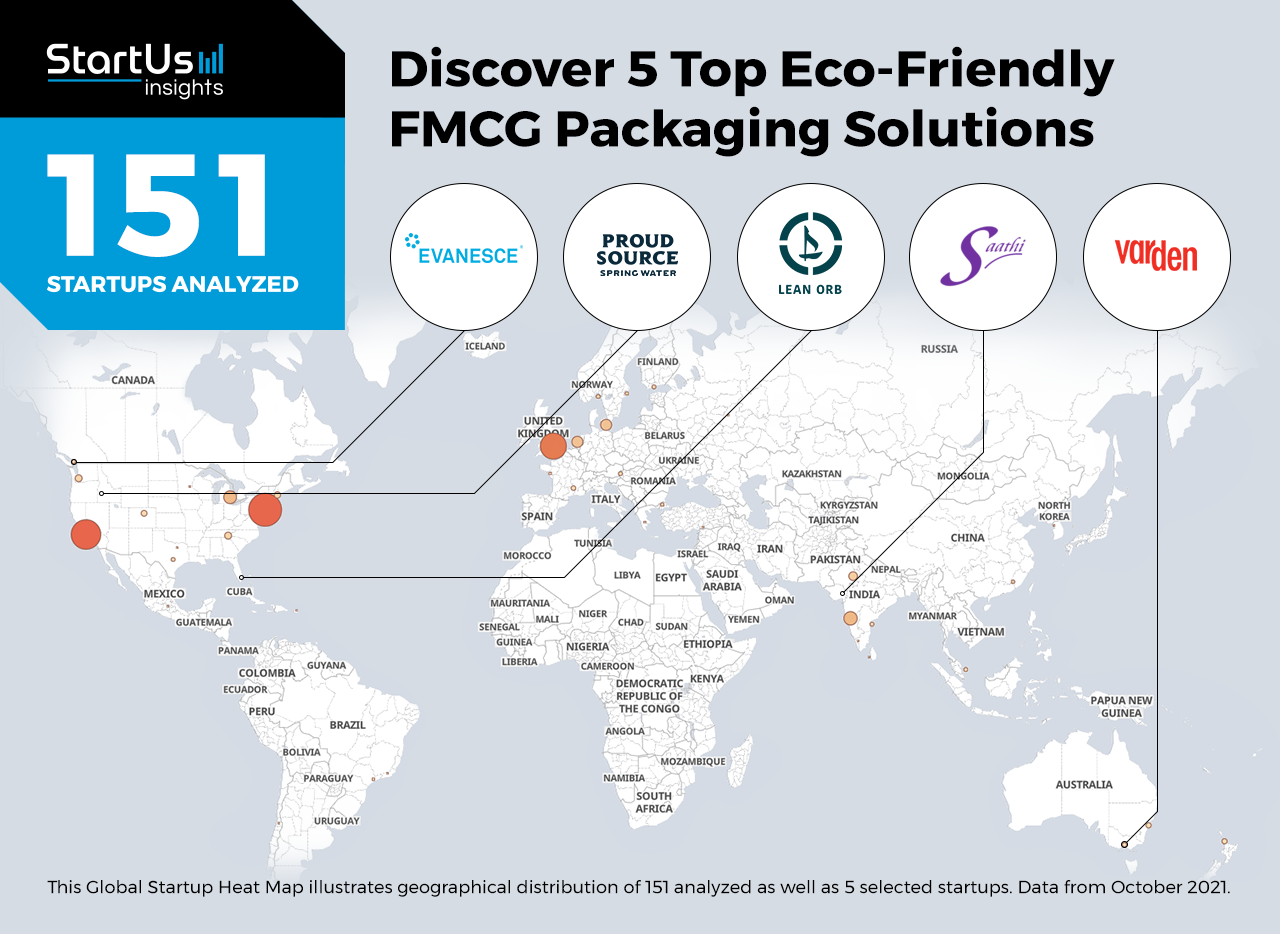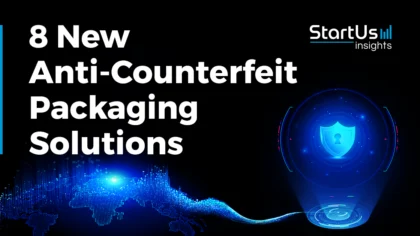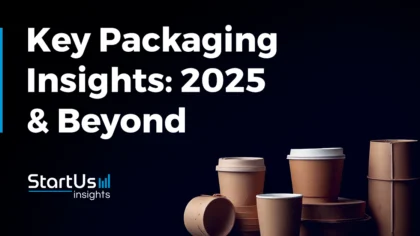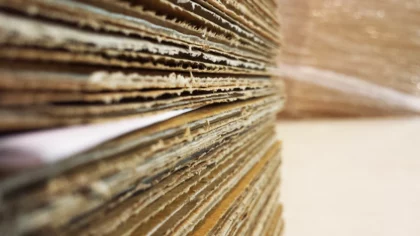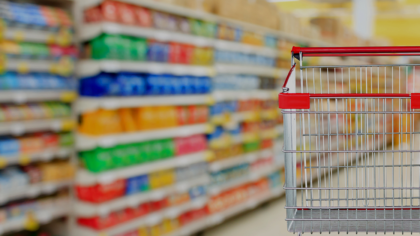Staying ahead of the technology curve means strengthening your competitive advantage. That is why we give you data-driven innovation insights into the packaging industry. This time, you get to discover 5 hand-picked eco-friendly fast-moving consumer goods (FMCG) packaging solutions.
Out of 151, the Global Startup Heat Map highlights 5 Top Eco-Friendly FMCG Packaging Solutions
The insights of this data-driven analysis are derived from the Big Data & Artificial Intelligence-powered StartUs Insights Discovery Platform, covering 2 093 000+ startups & scaleups globally. The platform gives you an exhaustive overview of emerging technologies & relevant startups within a specific field in just a few clicks.
The Global Startup Heat Map below reveals the distribution of the 151 exemplary startups & scaleups we analyzed for this research. Further, it highlights 5 packaging startups that we hand-picked based on criteria such as founding year, location, funding raised, and more. You get to explore the solutions of these 5 startups & scaleups in this report. For insights on the other 146 eco-friendly FMCG packaging solutions, get in touch.
Varden develops Agricultural Residue-based Packaging
Due to the natural properties of metals and plastics to limit oxidation, they constitute a majority of materials in the packaging industry. However, both of the above-mentioned materials compound environmental degradation. Moreover, recycling metal-based products require dedicated facilities that add to the carbon footprint. As a result, startups develop packaging solutions based on eco-friendly materials. For example, engineering agricultural residue to develop FMCG packages enables sustainability.
Australian startup Varden designs packages from natural fibers. The startup uses natural molded pulp fibers to create sustainable and high-performing food packaging. Its products are capable of food preservation by limiting oxidation and controlling moisture. The biomaterial sources come from agricultural residues and the startup repurposes these natural fibers. FMCG companies are, thus, able to integrate eco-friendly materials that perform on par with metal and plastic.
Proud Source Water offers Aluminum Packaging
Water bottles usually constitute single-use plastics. Besides, recycling these materials constitutes a challenging task and most of the plastic waste ends up in the global oceans and waster systems. This negatively impacts marine ecosystems. Working towards an effective solution, startups provide eco-friendly materials to replace single-use plastics. For example, aluminum bottles are both recyclable and reusable, providing businesses and consumers with a sustainable packaging choice.
US-based startup Proud Source Water utilizes aluminum packaging for water bottles. The startup uses a gravity-fed system to bottle spring water at the source for an energy-efficient and sustainable operation. It uses aluminum for bottles and caps. Additionally, the bottles are bisphenol-A (BPA) free and, hence, offer safe drinking quality. The solution enables brands and consumers who seek sustainable alternatives to shift away from single-use plastic bottles.
Lean Orb provides Biodegradable Packaging
The relative ease of access, manufacturing, and flexibility influences users and producers to rely on plastics. With growing waste collation, however, it is clear that reliance on plastic is unsustainable. Research and development (R&D) of materials that are recyclable or biodegradable allow for cleaner approaches to consumer packaged goods (CPG). Because of this, startups develop biodegradable, plant-based packaging products.
Lean Orb is a US-based startup that uses natural materials to develop eco-friendly FMCG packaging. The startup applies fibrous sugarcane stalks to produce sustainable plates, bowls, to-go containers, and cups. Using areca palm leaf enables the development of disposable tableware for all purposes. The startup also utilizes bamboo, wheat straw, birchwood, and post-consumer paper to supply FMCG packaging products. With these solutions, FMCG companies provide compostable and sustainable packages to consumers.
Evanesce develops Starch-Based Packages
Food waste provides an avenue for alternative solutions to waste management. These products are biodegradable and recyclable. Re-engineering these components provides packaging companies with opportunities to integrate eco-friendly packaging into their products. To this end, startups utilize food waste to create sustainable packages. For example, upcycling food waste allows FMCG companies to provide completely compostable packaging containers.
Canadian startup Evanesce upcycles food waste to develop sustainable packaging. Its plant-based and compostable food packages offer reliability for the transportation of food. The Evanesce Molded Starch Technology products are free from synthetic polymers and decompose into the soil within 90 days while having a shelf-life of 2 years. The startup uses a bio-based coating which makes the products leakproof and heat resistant. They are also microwave- and oven-safe. FMCG companies rely on the startup’s products to offer sustainable packaging solutions.
Saathi Pads offers Biodegradable Sanitary Pad Packaging
Materials that aid in menstrual hygiene require sufficient porosity and absorptivity to adequately assist women during periods. Contemporary options for menstruation packaging leave a considerable impact on the environment after product use. While eco-friendly pads mitigate environmental issues for the product, their packaging is not environmentally friendly. For this reason, startups develop biodegradable packaging for sanitary napkins.
Saathi Pads is an Indian startup that offers biodegradable packaging for sanitary pads. Along with packaging, the startup uses bamboo and banana-based fibers to design pads that naturally biodegrade in 6 months after utilization. This, in effect, allows consumers to manage waste at homes and reduce the overall environmental impacts of menstrual hygiene products.
Discover more Packaging Startups
Packaging startups such as the examples highlighted in this report focus on sustainable packaging, bio-based packaging materials, and plastic-free packaging. While all of these technologies play a major role in advancing the packaging industry, they only represent the tip of the iceberg. To explore more packaging technologies, simply get in touch to let us look into your areas of interest. For a more general overview, you can download our free Packaging Innovation Report to save your time and improve strategic decision-making.


